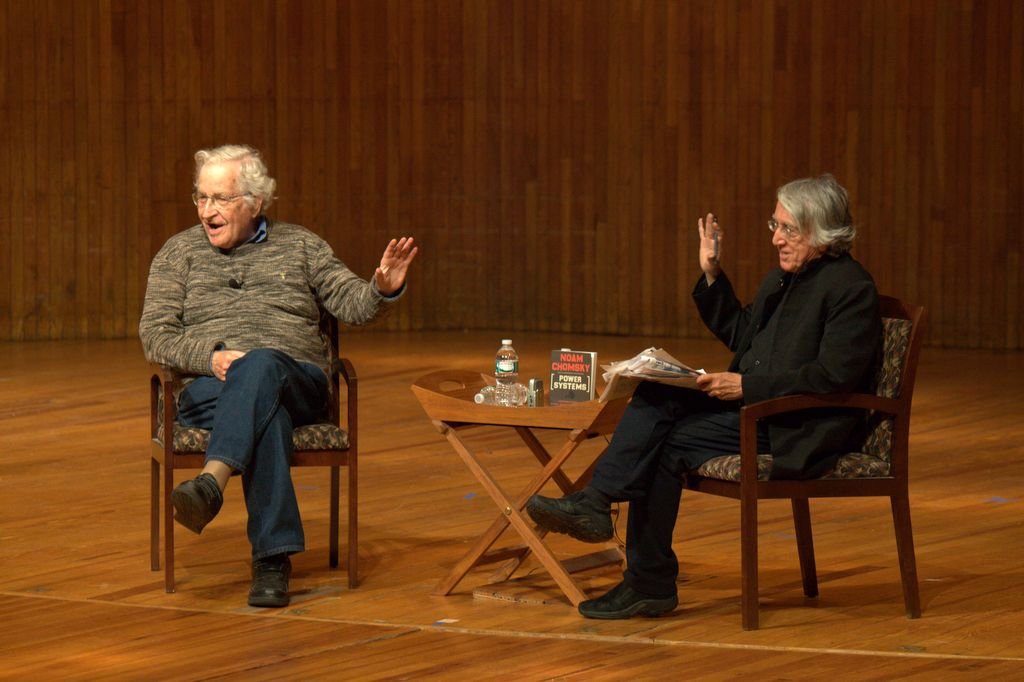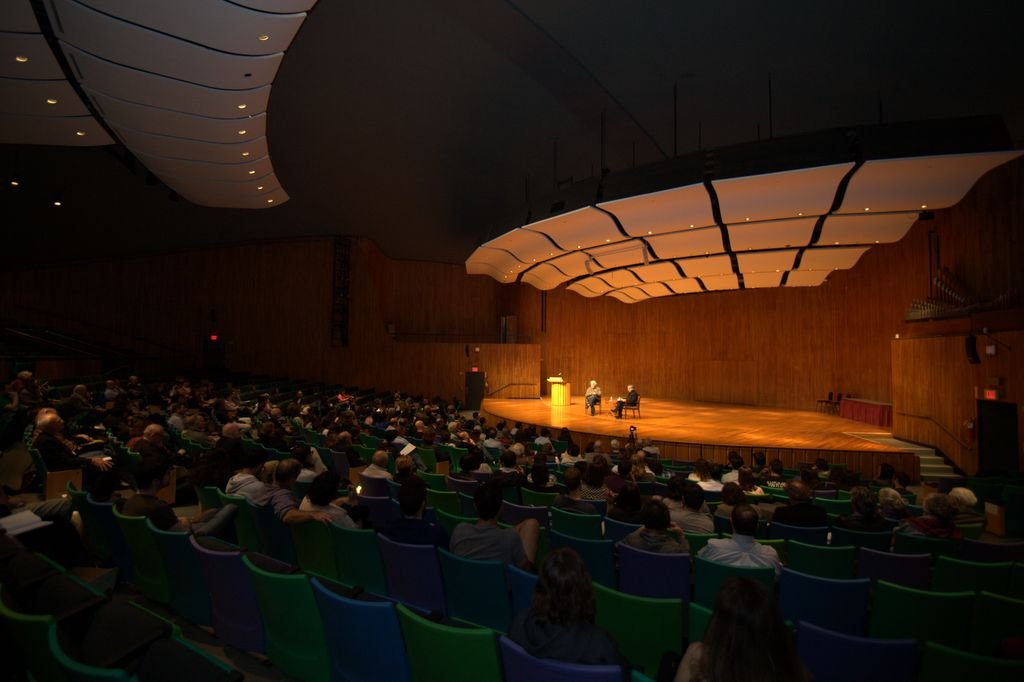CAMBRIDGE, Mass.—A distinguished line-up of speakers from Armenia, Turkey, Europe, and the United States examined Turkey, the media, Turkish-Armenian relations, and genocide reparations at the Armenians and Progressive Politics (APP) conference held at the Massachusetts Institute of Technology (MIT) on Sept. 26-27.

In the opening plenary on Sept. 26 in MIT’s Kresge Auditorium, APP organizing committee member Khatchig Mouradian delivered welcoming remarks and invited internationally renowned scholar, activist, and public intellectual Noam Chomsky and Alternative Radio’s David Barsamian to the podium. Chomsky and Barsamian discussed imperialism, social movements such as the Gezi Park protests in Turkey, its treatment of the Kurds, ISIS, the implications of the recent Scottish referendum, “worthy” versus “unworthy” victims, and Turkish politics.

Panels on the media, Turkish-Armenian relations, reparations for the Armenian Genocide, and a closing discussion took place the following day, also at MIT.

How and why the mainstream media has created its narrative on Armenian and Turkish issues was explored by Levon Chorbajian of UMass Lowell, filmmaker Carla Garapedian, and journalist Aris Nalci from Istanbul, and moderated by writer/activist Laura Boghosian. They looked at how corporate and foreign policy considerations influence reporting on Armenia and Turkey, particularly on the Armenian Genocide, which is often framed as a controversy rather than a fact.
Examining Ben Bagdikian’s monumental work The Media Monopoly and the book co-authored by Edward S. Herman and Noam Chomsky titled Manufacturing Consent: The Political Economy of the Mass Media, Chorbajian explored the ways in which the media operates in the U.S. and how that impacts their reporting on a number of foreign policy issues, including the Armenian Genocide.

Garapedian argued that the formula “more media coverage leads to justice,” does not hold. She highlighted cases over the past two decades when the mainstream media covered the Armenian Genocide, and then the news cycles moved on, and the coverage did not result in U.S. recognition and justice.
Nalci discussed the situation of the mainstream media in Turkey, providing insight into the way the media operates through analysis and several examples from recent years. Talking about the Turkish media’s coverage of the Armenian Genocide, he argued that more coverage does not necessarily mean better coverage, and predicted more of the same as the centennial of the Genocide approached.

Prof. Bilgin Ayata traveled from Berlin, Germany, to join Peter Balakian of Colgate University, Marc Mamigonian of the National Association of Armenian Studies and Research (NAASR), and the University of Chicago’s Ronald Suny. The panel—moderated by Mouradian— considered several aspects of Turkish-Armenian relations.
Ayata discussed Kurdish-Armenian relations in light of recent developments. As power asymmetries and serious problems in discourse marred Turkish-Kurdish and Turkish-Armenian relations, Ayata called for a robust Kurdish-Armenian dialogue that confronts the past and examines avenues of cooperation on the foundation of justice.
Mamigonian discussed how Armenian Genocide denial in recent years has focused on “manufacturing doubt” rather than blatantly denying the veracity of the genocide, as the latter approach has become discredited.

Suny discussed the Workshop on Armenian and Turkish Scholarship (WATS) conference series, a project that brings together Turkish, Armenian, and other scholars to examine various aspects of the Armenian Genocide and Turkish-Armenian relations.
Balakian spoke about the paranoid style in Turkish politics and how that is reflected in the destruction and neglect of Armenian cultural heritage and the obfuscation of the contributions of Armenian architects over the centuries.
Ümit Kurt from the Strassler Center for Holocaust and Genocide Studies at Clark University, attorney Edvin Minassian of the Armenian Bar Association, and Thomas Samuelian, dean at the American University of Armenia (AUA) in Yerevan, discussed the confiscation of Armenian property during the Genocide and demands for reparations and restitution for this crime against humanity. The panel was moderated by Henry Theriault, professor and chair of the philosophy department at Worcester State University.
Kurt presented an overview of the meticulous process through which the Ottoman and then the Turkish state coded into law the complete dispossession of the Ottoman-Armenian citizenry, making every effort to seal every legal avenue within the Turkish justice system for Armenians to reclaim what had been termed “abandoned properties.” Kurt classified these legal maneuvers by the Kemalist government as phase two of the genocide.
Samuelian and Minassian discussed legal channels and strategies that might be pursued for reparations and restitution in Turkish and international courts.
Samuelian stressed that Armenians must also pursue reparations claims against all countries and entities that benefitted from the genocide and continue to benefit today. He also argued that reparations should not be tied to or come after genocide recognition—as they are two separate processes that can run parallel. He also discussed the significance of the church claims, as the Armenian church was the biggest landowner.
Minassian focused on specific legal cases, such as the California insurance case, and the complications resulting from the court declaring that that the case could not proceed because the U.S. government has not officially recognized the genocide.
To close the conference, Ayata, Samuelian, Garapedian, and ARF Eastern Region central Committee co-chair Dr. Antranig Kasbarian discussed the question, “Where do we go from here?” The discussion was moderated by historian Dikran Kaligian, managing editor of the Armenian Review. After brief presentations by panelists, Kaligian invited the audience to share their proposals and ideas concerning the topics discussed during the conference. The result was a lively discussion on a number of subjects.
The conference was successful not simply for the ideas presented, but for the wide range of active participation from scholars, journalists, filmmakers, lawyers, and activists in the audience.
A video recording of the entire conference will be made available online soon.
The conference was organized by the Armenian Revolutionary Federation (ARF) Eastern Region USA, and co-sponsored by Alternative Radio, and the MIT Armenian Society. For additional details, visit www.armenianprogressive.com.
To watch the opening plenary, featuring Noam Chomsky and David Barsamian, click here.


some survived the sword and starvation and were dispersed all over the world and their sons and daughters like me lived with the open wound ,
an apology is not enough, my anger over the years has grown because they still profit and deny my being as if nothing happened,
only a strong nation can earn the respect and justice it deserves.
That is exactly what I desire ,SAM…WE need to get stronger and be able to throw our weight around…
I wrote a lengthy article (in Armenian) to amny a periodical-Armenian- of course and friends that afte Tigran the Great, we left getting to be strong and well ar,med.Whereas our two beautiful neighbours do nothing but ARM THEMSELVES MORE AND MORE.
tIME TO START DOING IT OURSELVES….
HOPE PEOPL REALIZE THAT WE ARE A NATION /STATE NOW,NO MORE PEOPLE,TIME TO WAKE UP AND GET THE BEST OF WEAPONS AND TRAION OUR young in Diaspora almost impossible -then go to RA and do it there for a stint of a couple months I have also written about that
From UN/Geneva. Today the inderstanding is there will be no solutiont the Armenian problems (genocide, recognition, reparation, land claims, blockade, Arsakh and other) outside decisions (and actions) by the international community at high-level political and human rights forums. In other words, only the Security Council and other UN bodies can offer a just forum for exposing and claiming Armenian rights. UN being the only universal institution universal with the appropriate tools and mechanisms (including the cretaion of tribunals) dealing with genocide, self-determination, minorities, etc. etc. So time has come to switch from bilateral (and intellectual)fora to international moves. Creating a Diaspora civil society organization (an NGO) which not only supportS the Armenian delegation but can speak out loud to the face of the world of Armenian TRUTHS and claims. Rights now at the highest level we are submerged by cut-throat negationism and violent hatred and war threats against Artsahk. aline d.